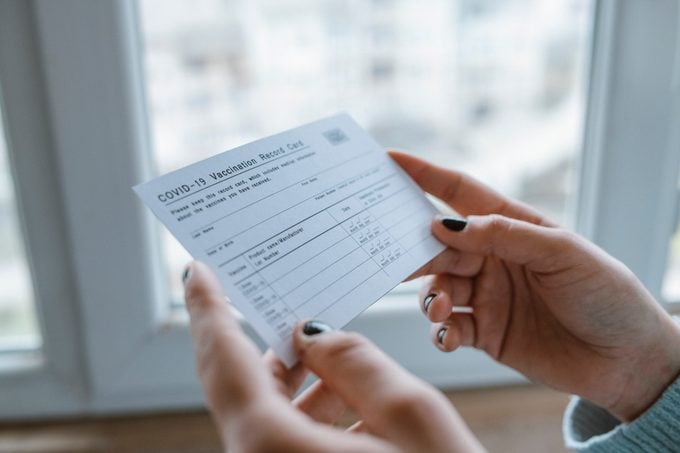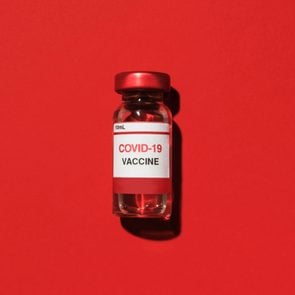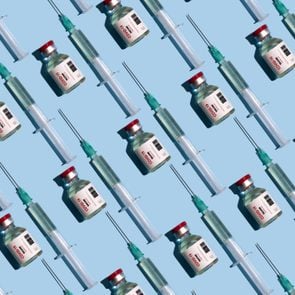Got Your Covid-19 Vaccine Card? 4 Things You Should Do Right Away
Updated: Jul. 28, 2021
Here's what experts say you should and shouldn't do with your Covid-19 vaccine card after getting your Covid-19 shot.
Covid-19 vaccination cards are essential documents
Close to 163 million people in the United States have been fully vaccinated and presumably have a funky new Covid-19 vaccination record card to prove it.
What now? Should you carry it with you? Leave it at home? Laminate it? Put it in a safe-deposit box?
We don’t know exactly how the new cards, issued by the Centers for Disease Control and Prevention, will be used, but they have joined the ranks of life’s essential documents.
“Make sure you protect it like a birth certificate,” says Scott Weisenberg, MD, an infectious disease physician and director of the travel medicine program at NYU Langone Health in New York City.
What are vaccination cards?
The cards are proof that you have been immunized against SARS-CoV-2, the virus that causes Covid-19.
The information listed is short, sweet, and important: your name, date of birth, which Covid-19 vaccine you got, where you got it, and the date or dates of your jabs.
You will get your card before you’re actually fully vaccinated so pay attention to the last date marked.
Your immune system will be in high gear two weeks after the one-shot Johnson & Johnson (Janssen) vaccine and two weeks after the second dose of the Moderna or Pfizer-BioNTech vaccine.
The latter two vaccines require two shots, four and three weeks after the first, respectively.
What will vaccine cards be used for?
We’re still figuring out how the cards will fit into post-pandemic life.
They may be required by employers or future employers. Or they might be necessary if you want to go to school or university, attend large events, or participate in certain group activities.
For a while anyway, you may need them to visit Grandma in her nursing home.
Different states may also have their own systems.
New York State, for example, has introduced the Excelsior Pass, which will be digital proof of your vaccination via your phone or tablet.
You’ll be able to present it at different venues to gain access.
The Buffalo Bills are requiring that sports fans present proof via the Excelsior Pass in order to attend games.
What about vaccine passports?
A lot of people are hoping that the cards will free them up to travel with fewer restrictions.
Hawaii’s vaccine “passport” already allows travel between the islands without testing or quarantining.
(This is what to do if you missed the second dose of your vaccine.)
But the idea of vaccine passports is controversial in the United States, and a number of states, including Texas and Arkansas, have measures in place to restrict them. Certain countries, such as Israel, have vaccine passport systems already in place.
“This is an issue that people should stay on top of, both locally and internationally, if they plan to travel,” says Dr. Weisenberg.

Keep your vaccine card safe
You’ll need to protect your vaccination card.
That’s obvious enough, but what exactly does “safe” mean? It probably doesn’t mean carrying the card with you—you likely won’t need it every day, you may lose it, and it could fray and fade.
A safe spot may be in a drawer at home or at the office, or inserted into your passport.
The most important thing may simply be remembering where you keep it. “You may not realize how important it is till you need it and don’t have it,” says S. Wesley Long, MD, medical director of diagnostic microbiology at Houston Methodist.
The closest parallel we have right now is a yellow fever vaccination card, which is required to travel to certain countries.
“In those cases, we typically recommend that you keep it in a cool, dry space that’s not too humid and won’t make the ink degrade,” says Dr. Weisenberg.
You can also try using a watertight plastic protector.
(Find out about the documents and other items you should keep in a home emergency kit.)
Make copies of your card
Make that several copies—and do it right away.
“The first thing I would do is take pictures with my cell phone,” says Dr. Long. “It remains to be seen if people will want to see the actual card.”
The photo of the card, or a photocopy that you carry with you, may be enough to convince a stadium or employer that you’ve been immunized. But it may not be enough to travel.
In the case of yellow fever, you generally need the actual card with a stamp to travel, says Dr. Weisenberg.
There are efforts to have digital copies of the cards—in effect, touchless IDs—to make sharing and moving around easier.
Don’t laminate the card just yet
Your vaccine card has a couple of extra rows at the bottom labeled “Other.” These are for recording future booster shots to guard against constantly emerging variants. If you laminate your card, no one will be able to add new information.
If you’ve already laminated your card, don’t freak out, says Dr. Long. You can always get a replacement, either through your state health department or with the clinic or pharmacy that administered the vaccine.
Many states, including Ohio, keep a central database of who’s been immunized. “The general advice is to contact wherever you got the vaccine because they should have some record,” says Dr. Long.
Don’t post the card on social media
There’s sensitive information on there, including information (like your date of birth) that scammers would love to get their hands on. In addition to inviting identity theft, photos of vaccine cards help fraudsters create fake vaccine cards, which are already on sale, says the Better Business Bureau.
On the other hand, you definitely do want to boast about your vaccination status.
We need to get more people vaccinated in order to reach herd immunity, and this could help convince others.
Instead of your vaccine card, take a selfie of yourself getting jabbed, a photo of your “I got vaccinated” sticker, or a photo of yourself enjoying one of the Covid-19 freebies.
Or photograph yourself doing things with your newfound freedom. It’s great advertising.
Next, learn about what you can and can’t do once you’re fully vaccinated from Covid-19.



